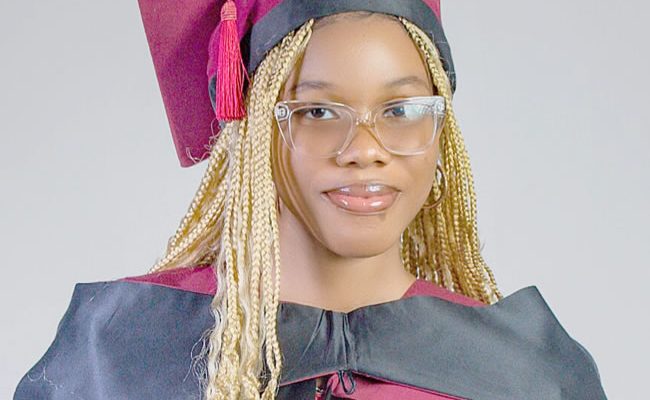

Chisom Okoh is a writer and a graduate intern at Hakakire Legal Consult. She graduate with a First Class from the Faculty of Law, Nile University of Nigeria, Abuja. She finished with a cumulative grade point average of 4.91 on a scale of 5.00. In this interview by Kingsley Alumona, she speaks about her academic feat and the Nigerian legal system.
At what point did you realise you wanted to be a lawyer? And what inspired you to pursue this dream?

I realised I wanted to be a lawyer in my second year of studying law, which might sound unusual since most people seem to know their career path from childhood. First, I wanted to be a doctor, then a forensic scientist, then an archaeologist, or a vet. After that, I was convinced for a while that being a journalist, or a chef, who hosted a cooking show, was my true calling. There was a lot of expectation that I would follow in my dad’s footsteps and become a doctor. Despite the meltdown, this decision set me on a path that ultimately led to law. It wasn’t until my second year of law school, after a particularly interesting contract class exploring the intricacies of an offer, that the spark for the profession ignited.
As of the time you applied to study law, there were over two hundred universities in Nigeria. Why Nile University? Did your university meet your expectations?
I got admission into three universities but my parents decided to go with Nile University. One of the key reasons was its proximity to home, as I had never travelled far before. Also, the law programme at Nile University was fully accredited, which assured us that I would transition into law school immediately after graduation without issues related to backlog or delays.
The university and its law faculty met my expectations in terms of quality education and innovation. The Nile University law faculty comprises a team of brilliant lecturers who are deeply devoted to their craft, training students to become outstanding legal practitioners.
What aspects or areas of law interest you more and why?
For now, I am interested in company law. My interest developed during the second semester after I received a C in the course in the first semester. It became my mission to master the subject thoroughly, and in the process of delving into the details of each topic, I discovered a genuine passion for it. I am also gaining a deeper interest in artificial intelligence (AI) law and technology law. With the rapid proliferation of AI in various aspects of technology, I find it fascinating to explore how ethical rules can be established to ensure AI does not violate human rights. This intersection of law, ethics, and innovation is a challenge that I find exciting.
Tell us about your first moot court experience.
My first moot court experience was as counsel representing the defendants. The plaintiffs had sued us for negligence, and our defence was based on contributory negligence. We argued that the damages should be reduced since the plaintiff had also been negligent. We won. To win a case, preparation is key. You must do your homework thoroughly.
What was the title of your final-year project and what were the major findings from it?
The title of my final year project was ‘An analysis of the electronic collation of results under the Nigerian Electoral Act 2022 with a focus on the 2023 general elections’.
One of the major findings was that to ensure the reliability of electronic collation systems, regular maintenance and testing protocols should be established as it was found that the technical glitch the IRev server experienced could have been solved by extensive testing.
In your LinkedIn post, you stated that during your five-year law undergraduate study, you had 56 As, 3 Bs, and 1 C. Which courses did you make the three Bs and one C?
I got the Bs in Constitutional Law 1, Land Law 1, and Research Methodology. The C was in Company Law 1. It is funny you asked this question because I have dealt with the feelings a long time ago. I do not believe in regrets or dwelling too much on past mistakes. I remember seeing the B in the constitutional law when the first-semester results rolled in. I was so distraught as it meant that my dreams of graduating with a 5.0 had been dashed. I cried for at least four weeks and couldn’t eat without throwing up. I can be quite dramatic at times, and I laugh at it now.
Although at the time, 200-level Chisom thought her world had come to an end. Each experience, as regards failing to meet up with a goal, is a lesson. Pick up the lessons and use them to improve.
Late last year, you announced that you made it to the third stage of the Age of the Legal Scholar competition, in which you did a presentation on ‘The future of data protection legal framework in the age of artificial intelligence’. So, how do you think legal frameworks could help manage the impeding dangers artificial intelligence poses to data and the future of work in Nigeria?
Data is the lifeblood of AI, and the quality and ethical use of this data determines the outcomes these systems produce. However, without adequate legal safeguards, there is a heightened risk of misuse, exploitation, and erosion of trust in systems that rely on AI.
One use case that comes to mind is the NHS DeepMind scandal in the UK, where 1.6 million patient health records were shared with Google’s DeepMind to develop an AI system for detecting acute kidney injuries. While the intention was noble, the absence of consent from patients led to a significant depletion of trust in the UK healthcare system. In the Nigerian legal landscape, there is a lacuna. The Nigeria Data Protection Regulation (NDPR) and the Nigeria Data Protection Act (NDPA) don’t explicitly address the risks and ethical considerations of processing data within AI systems. This leaves room for potential abuse of sensitive personal data and the inability of individuals to seek redress when their rights are violated.
To manage these risks effectively, Nigeria needs to introduce legislation that specifically governs how data is collected, stored, processed, and used within AI systems and also addresses ethical considerations. These laws should require transparency, informed consent, and ensure data minimisation principles. Nigeria can learn from jurisdictions with robust AI governance frameworks, i.e., the European Union, adapting global best practices to the local context.
Last November, you and other top-performing first-class law students organised a masterclass on what you posted on LinkedIn as “My secrets to excelling as a law student.” Tell us about it.
It was an enriching session. All-round excellence is key. Excelling in just one area is not enough. You must possess courage and positivity in the face of adversity. Challenges are inevitable, but they can be valuable learning opportunities. I always say “Cry, learn the lesson; cry again and move on.” Learn the lesson and move on.
You did your graduate internship at Hakakire Legal Consult. What is it that you learnt at Hakakire that you did not learn or understand while training as a lawyer at Nile University?
I am currently undergoing my graduate internship with Hakakire Legal Consult. I have the privilege of working alongside brilliant colleagues who are deeply versed in the law. Working at Hakakire is unlike anything I have done before. The firm is uniquely focused on analysing the intersection of law and technology and bridging the gap between them by creating legal and ethical solutions.
Before joining the firm, I had very little knowledge of this field. Starting from square one has been challenging, but every day presents an opportunity to learn something new, often requiring extensive reading and research. This experience has pushed me into strange waters, but I’m finding my rhythm.
I am gaining insights and practical knowledge that extend far beyond what I learned at Nile University. The structured environment at school provided a strong foundation, but this internship has given me the opportunity to apply that knowledge in real-world scenarios, particularly in a cutting-edge area of law that continues to grow in importance.
A country is as good or bad as its legal system. As someone familiar with the Nigerian legal system, if you were to recommend three things that would strengthen the Nigerian legal system that would help make the country a better place than it currently is now, what would they be?
There has to be an increase in the number of courts, especially the Court of Appeal divisions, to facilitate quicker resolution of matters. There needs to be an overhaul of the salary structure as well as the retraining of the auxiliary staff of the courts, particularly those attached to the registrar’s office, is necessary. This would reduce the incidence of unethical practices such as court staff overcharging for affidavits and filing.
Popularising electronic filing across all 36 states is necessary as well as simplification of the interface of the current virtual filing system being that the current existing software is complex and prone to interruptions caused by server overload.
After law school, every fresh lawyer has a vision and dreams of what they want to do with their law training. What is the unique thing you want to do with your legal training and why?
One of my primary goals is to revolutionise the educational system in Nigeria. Education is one of the greatest tools for transformation — it has the power to shape a person’s mind and help them realise their full potential. It saddens me that this basic right is increasingly becoming a privilege, as the divide between the rich and poor grows wider.
I am also deeply concerned about the rising rates of femicide in Nigeria. I plan to use my legal training to advocate for and promote the advancement of women’s rights, especially in a society where patriarchy is still prevalent. It’s important to protect and defend the rights of women, and I am committed to doing my part.
It is interesting you are a creative writer, and was a finalist for literary contests and even co-wrote two plays that were performed at your university. What does writing mean to you?
It is a way to process my perception of things I have observed. The conversations I have and hear, the quirks I see in people, and the current state of Nigeria and the world. It is an outlet. When I observe and consume what life has to offer, I need to let down my thoughts. It is an escape as well. It’s the only chance to wear the mind of a person with a different life.








